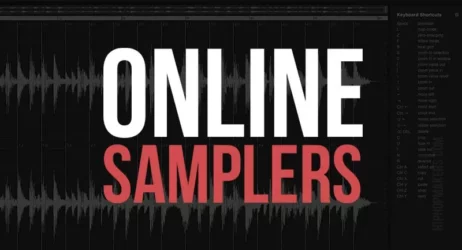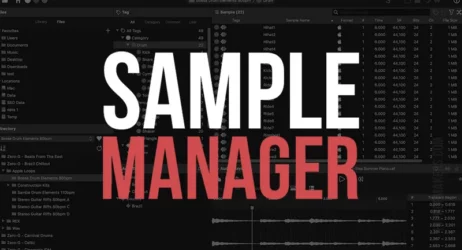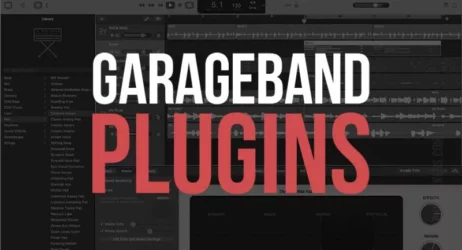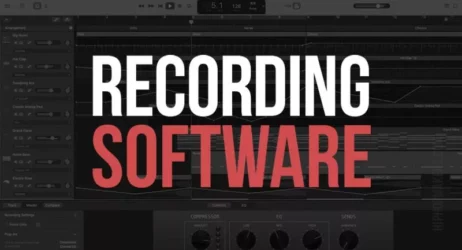Here are the best online music theory courses to learn basic concepts like scales and chords to more advanced topics such as musical form.
Learning music theory can be challenging. It’s a lot of information to take in, which can be confusing and overwhelming. However, following an online course can teach you the basics and advanced concepts of music theory in an engaging way.
All these online music theory courses are on Skillshare. You can get access to all these classes by signing up for a 30-day free trial. Cancel at any time.
Skillshare has over 28,000 online classes covering all aspects of music production, including audio recording, music theory, mixing, piano, and more.
This post contains affiliate links for which we receive a commission at no cost to you.
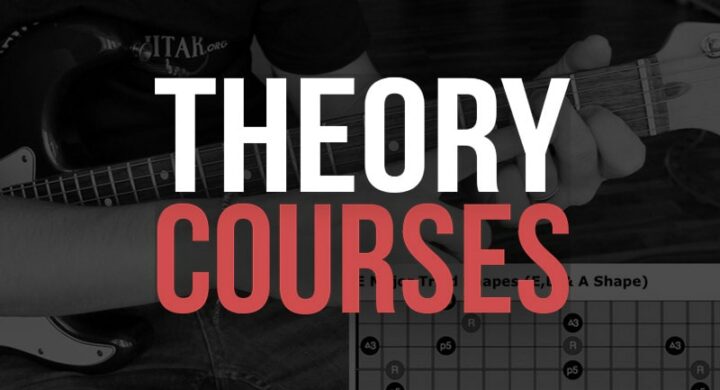
Best Online Music Theory Courses
Browse through the list to find the online music theory course that’s right for you.
- Exploring Sound, Rhythm, Melody
- Music Theory Fundamentals
- Basics of Music Theory in 30 Minutes
- Music Theory for Beginners
- Music Theory Survival Guide
- Practical Music Theory For Producers
- Music Theory Comprehensive
- Music Theory Comprehensive
- Music Theory for Electronic Producers
- Music Theory 101 For Guitar
- Music Theory for Electronic Musicians 2
- Music Theory for Electronic Music
- Music Theory & Chords
- Music Theory Comprehensive
- Music Theory for Musicians
1. Music Theory: Exploring Sound, Rhythm, Melody
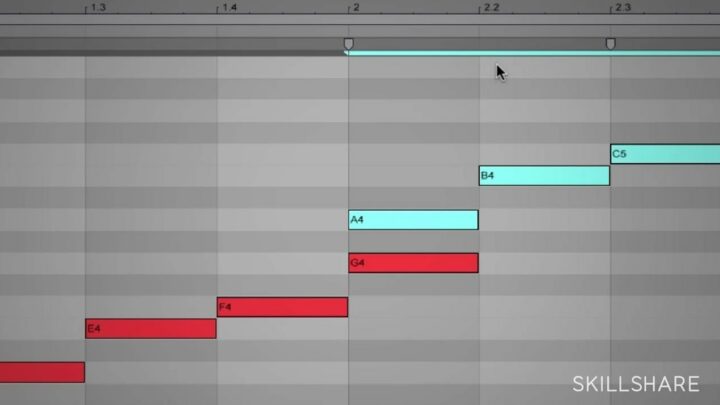
This online music theory course is designed for music creators and producers. The course offers an in-depth exploration of sound, rhythm, and melody.
You’ll learn how to read and write music using traditional notation and MIDI grid sequencing.
You’ll also learn about musical forms, harmonic and melodic minor scales, and chord construction.
This is the best online music theory course for anyone interested in composing, recording, and producing with MIDI sequencing.
Students: 8,200+ | Rating: 88%
What’s Covered
- Does Music Theory Matter?
- MIDI Sequencer Vs. Traditional Notation
- Creating a Practice Schedule
- Sound Waves and the 12-Pitch Palette
- Sharps, Flats, Whole Steps, and Half Steps
- Tension, Resolution, and Musical Forms
- Simple Meters: Duple, Triple, and Quadruple
- Simple Note Lengths
- Triplets, Playing Triads
- Six Major Intervals
- Four Minor Intervals
- The Interval Project
- Major Scales
- Relative Minor Scales
- Harmonic and Melodic Minor Scales
- Recapping Basic Scales
- Major and Minor Triads
- Diminished and Augmented Triads
- Two Types of Chords
- Three Diminished Chords
- Reading and Playing Chord Symbols
- Finding the Diatonic Major Chords
- Sketching Songs
- Finding the Diatonic Minor Chords
2. Music Theory Fundamentals – Beginner
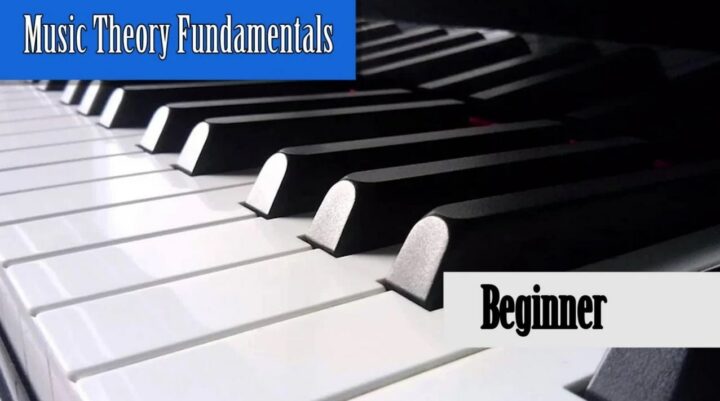
This online music theory course for beginners is a great way to learn about the basics of music theory. It covers scales, pitches, intervals, rhythm, and meter.
You’ll also learn about the major and minor scales and intervals. By the end of this online music theory course, you’ll be able to identify intervals and scales in melodies, chords, and bass lines.
Students: 3,900+ | Rating: 84%
What’s Covered
- Scales and pitches the white keys
- Black Keys and a new scale
- Bonus Lesson – A lesson in listening
- Intervals of the major scale
- The minor scale
- Bonus lesson Major vs. Minor
- Intervals of the minor scale
- Basics of Rhythm and Meter Review
3. The Basics of Music Theory in 30 Minutes

We recommend this online music theory course for anyone looking to learn more about music theory. It is very helpful and informative and includes all the basics of music theory in about 30 minutes.
Students: 160+ | Rating: 99%
What’s Covered
- Notes of the Piano
- Whole Steps and Half Steps
- Scales and Keys (how to form)
- Relative minor scales
- The Number System
- Major and Minor chords
- The Chords in a Scale
- Chord Inversions
- Basics of Rhythm
4. Music Theory for Beginners

If you’re looking for an online music theory course that will take you from beginner to pro, look no further than this one.
You’ll learn all about the basics of music notation and how to read and write music on a staff. You’ll also explore time signatures, key signatures, and chord progressions.
Students: 400+ | Rating: 67%
What’s Covered
- Staves
- Clefs
- Ledger Lines
- Note Duration
- Measures & Time Signatures
- Rest Duration
- Dots & Ties
- Semitones and Accidentals
5. Music Theory Survival Guide
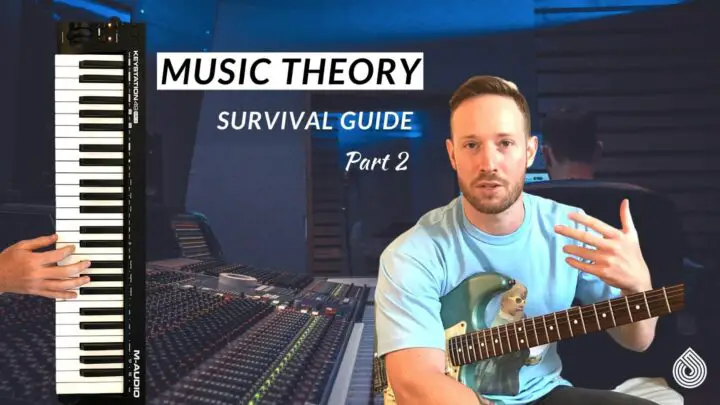
This online music theory course is perfect for all skill levels, from beginners to pros. In Part 2 of the course, you’ll learn about minor scales, intervals, triads, and songwriting using a minor scale.
You’ll also get plenty of practice in each of these areas so that you can master the material.
Students: 50+ | Rating: 99%
What’s Covered
- Minor Scale
- Relative Minor 1
- Minor Scale Intervals
- Minor Scale Practice
- Minor Scale Triads
- Minor Scale Triads Practice
- Relative Minor 2
- Songwriting Template Minor
6. Practical Music Theory For Producers – Writing In Key
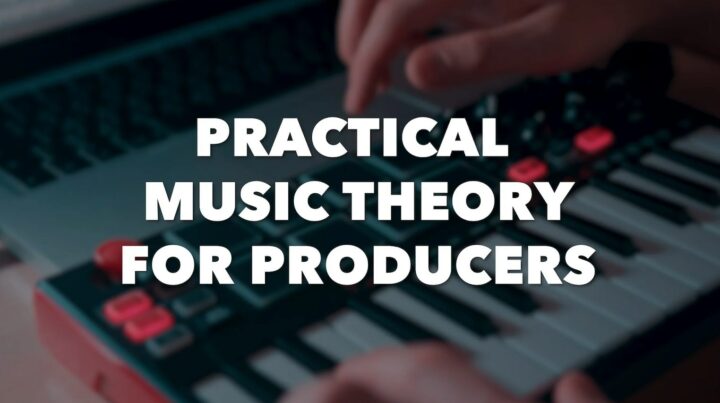
This course will teach you all about music theory. One of the main topics it will address is writing in a key, an essential issue for producers and music creators.
You’ll also learn how to analyze songs and to learn their chords.
Students: 800+ | Rating: 91%
What’s Covered
- Your Class Project
- The Musical Alphabet
- What Is A Key?
- Major Vs. Minor
7. Music Theory Comprehensive – How To Read Music

This online music theory course is for those who are just beginning to learn how to read music.
The course will cover the basics of pitch names, pitch classes, intervals, octaves, notes on the staff, clefs, basic rhythm, beat divisions, and more.
You must learn to read music if you wish to be serious about music, and this online course is a great way to get started.
Not only will it help your theory skills, but you’ll also learn things about the notes on the guitar fretboard, keyboard layout, half-steps, whole steps, how tempo works with beats per minute, etc.
Students: 17,300+ | Rating: 98%
What’s Covered
- Tools You Need
- Muse Score
- The Elements Of The Score
- Pitch Names
- Pitch Classes
- Octaves
- The Keyboard Layout
- The White Keys
- The Black Keys
- Half-steps & Whole Steps
- Staff Overview
- Clefs
- Treble Clef Refresher
- Naming Notes & Intervals
- Octave Names
- Beat And Beat Divisions
- Duple Vs. Triple
- Tempo Down Beats & Upbeats
- Basic Ryhtmic Elements
8. Music Theory Comprehensive: Chords, Scales, & Keys

This online course covers the topics of chords, scales, and keys. It also includes video examples to provide visual information on playing music by using your instrument or keyboard.
The course starts by introducing scales, including chromatic and diatonic scales. It also provides information on how to label any note as a scale degree and identify key signatures.
There are also various online exercises provided for students who are following the online course.
Students: 5,300+ | Rating: 99%
What’s Covered
- Tools You Will Use
- What Are Scales
- Chromatic And Diatonic
- Ordered Pitch Class Collections
- Chromatic Scales
- Whole And Half Pattern
- Scale Degree
- Practice
- Using Major Scales
- Melody Analysis
- What Is A Key
- Major Key Overview
- What Are Key Signatures
- Identifying Key Signatures
- What Are Chords
- Song Analysis
9. Music Theory for Electronic Music Producers
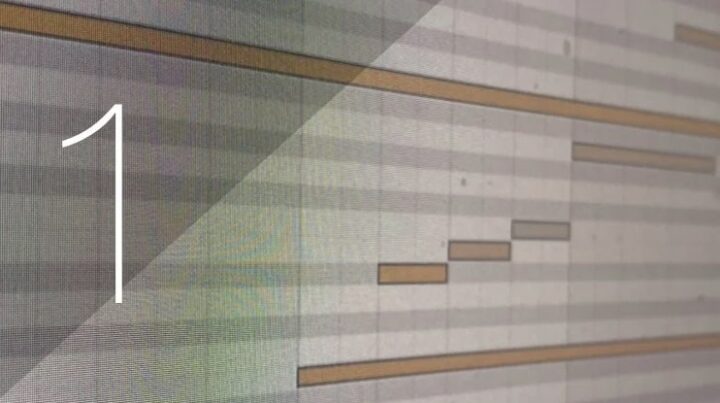
This online music theory course for electronic music producers is designed to help you understand the basics of music theory.
The course covers everything from the keyboard layout to chord progressions and inversions. You’ll learn how to create chords and melodies that sound great together and how to work with different keys and intervals.
Students: 8,700+ | Rating: 94%
What’s Covered
- The Keyboard Layout, Middle C, and Octaves
- The Perfect 5th, and being “In Key”
- More with Keys, The Third, and the Basic Triad
- Diatonic Chord Progressions & Inversions
- 7th Chords
- Other Intervals
10. Music Theory 101 For Guitar
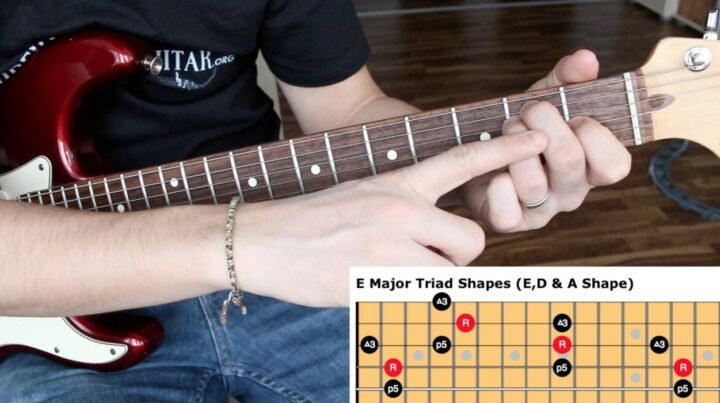
This online music theory course will teach guitarists about the basic concepts of music theory. The course will cover building chords and scales, providing a magical formula to understand it all, key signatures, triad islands, and more.
Students: 4,000+ | Rating: 97%
What’s Covered
- The Magical Formula
- The Magical Scale Shape
- How To Build A Triad
- Introduction To Triad Islands
- Triad Islands Close-Up
- Minor Triads
- Unlock Any Musical Key
- Musical Keys
- Major & Minor Keys
- Introduction To Intervals
- Intervals
- 6 Main Triad Types
11. Music Theory for Electronic Musicians 2
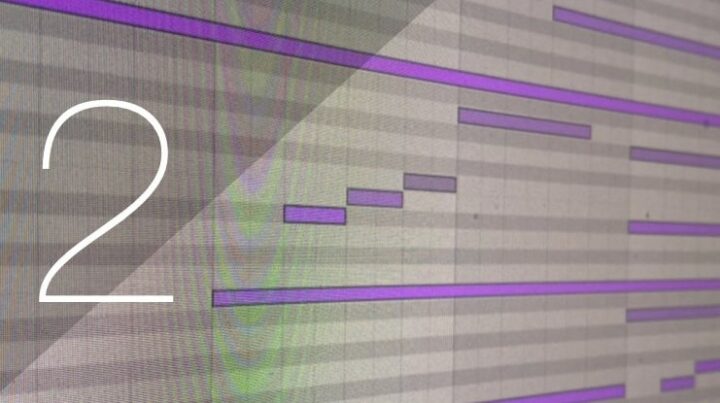
If you’re looking to dive further into music theory, then this course might be perfect for you.
The course is designed for intermediate and advanced students and covers chord substitution, minor keys, and modulations.
You’ll also learn how to create tension and release in your music and use harmonic progressions to write better melodies.
Students: 1,700+ | Rating: 99%
What’s Covered
- Avicii Analysis
- Minor Scales
- Minor Chord Progressions
- Harmonic Minor
- Deadmau5
- 7th Chords
- Cluster Chords
- Melody From Chords
- Chords from Melody
- Basslines Root Notes
- Bass Riffs
12. Music Theory for Electronic Music Producers

This online music theory course for electronic music producers is designed to help you understand the critical concepts that underlie music theory.
You’ll explore topics such as melody, harmony, chord progressions, and rhythmic structure and learn how to apply these concepts to your music.
Students: 1,600+ | Rating: 95%
What’s Covered
- Keyboard Layout and Octaves
- Basic Music Theory Terms
- Working out Major Scales
- Perfect 5ths
- The 3rd
- Perfect 4ths
- Chords and Inversions
- Chord Progressions
- Inversions
- 7th Chords
- Chord Extensions
- Suspended Chords
- Circle of 5ths
- Minor Scales
- Harmonic and Melodic Minor
- Arpeggios
- Bass Riffs and Adapting Melodies
- Arrangement
- Chords
- Melodies
- Chords
- Melodies and Arrangement
- Create a Song from a Drum Beat
13. Music Theory & Chords for Beatmakers & Producers
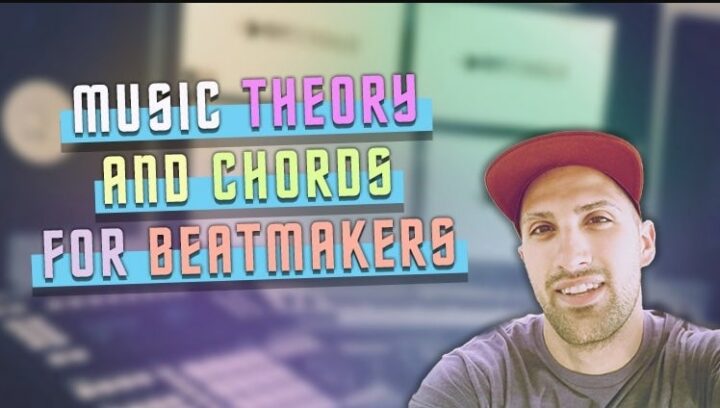
This online music theory course focuses on the fundamentals of music theory, concentrating on chords and chord progressions for beatmakers and producers.
With this online music theory course, you’ll be able to learn how to make better beats, chops, and instrumentals immediately after finishing the online music theory course chapters.
Students: 600+ | Rating: 91%
What’s Covered
- How to Ask Questions + Leave Review
- Counting Beats as Beatmakers
- How Notes Work in Music
- Understanding Scales
- Comprehending Chords Within Scales
- Advanced Chords and Inversions
- Putting Chords into Real-World Practice
- Working with a Bassline and Seeing How Our Music Theory Lines Up
- Making Our Music Sound Better with Available Free Tools
14. Music Theory Comprehensive: Minor Keys & More
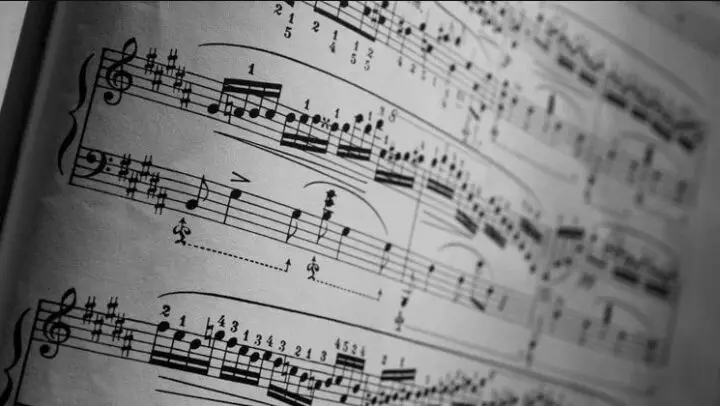
If you’re looking to dive deeper into music theory, this course might be perfect for you. This online course is designed to help you understand music theory more in-depth, and it covers a range of topics, from minor keys to chord progressions.
Students: 1,900+ | Rating: 98%
What’s Covered
- Key SignaturesReview
- Diatonic Chord Progressions
- Circle Of Fifths Overview
- Scale Degree Names
- Compound Meter Definition
- Compound Meter Signatures
- Alterations to Minor
- Music Theory Tutorial
- New Diagrams
15. Music Theory for Electronic Musicians – Harmony
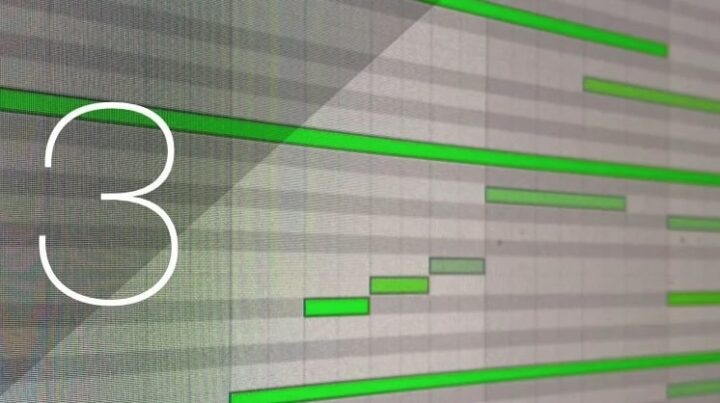
This online music theory course is designed for electronic musicians. It focuses on extended harmony, which is the study of chords that go beyond the basic triad. You’ll learn about chord substitution, chord progressions, and modulation.
You’ll also study modes. Modes are scales that go beyond the seven notes available in traditional major and minor scales.
Finally, you’ll learn about chromatic mediants, which occur when you change from one key to another using a half-step approach.
The online music theory course covers all of these topics in great detail so that you can better understand extended harmony, modulation, modes, and chromatic mediants.
Students: 1,000+ | Rating: 90%
What’s Covered
- Intro To New Harmonic Ideas
- Diatonic Chord Progressions
- How Modes Work
- Writing With Modes
- Chromatic Mediants
- Key Mapping Scales
- The Essence Of Scales
Frequently Asked Questions
Can You Learn Music Theory Online?
Yes, online music theory courses are an excellent way to supplement your learning. You can learn music theory online with top music theory courses. These online music courses are affordable, convenient, and of high quality.
Where Can I Learn Music Theory Online?
You can learn online music theory with the top online music courses listed above. These courses are online, affordable, convenient, and of high quality.
What Is The Best Online Music Course?
All online music courses are excellent. You need to find online music courses that suit your needs.
Can You Learn Music Theory For Free?
Yes, there are tons of websites where you can learn for free. You can even learn the basics of music theory on YouTube. But you should consider following a course because you can learn faster. Online courses are affordable and convenient. The courses listed above are the best music theory courses available on Skillshare.
Wrapping up, the journey of learning music theory is an exciting adventure that everyone, from a newbie to a pro, can embark on at their own pace.
Just like putting together a puzzle, you start with the basic building blocks, such as reading sheet music and getting your ear training. You’ll be amazed at how fast you can grasp the concepts of music.
Music is comparable to a language, and being able to read sheet music is equivalent to understanding how to read that language.
Music theory courses offer a great foundation, introducing key concepts and letting you explore other topics like music history and contemporary music.
These courses are like your own personal music teacher, guiding you every step of the way.
A music degree can be the next step for those who want to explore music more deeply. However, you can gain a great deal of musical knowledge even without it.
There’s always something new to learn, from the basics of musical notation to the complex art of music composition. For most people, a great course will cover a broad range of topics, not only making you a better musician but also enriching your understanding of how music has evolved over time.
There’s no shortcut to mastering music theory, but the journey is certainly worth checking out.
With these online courses, you get to learn and grow in the world of music, embracing the rich history and evolving trends of contemporary music. So grab your sheet music, tune in your ears, and let the melody of knowledge guide you in your music journey.
I hope you find these online music theory courses to be helpful.
Related: What Is Music Theory


